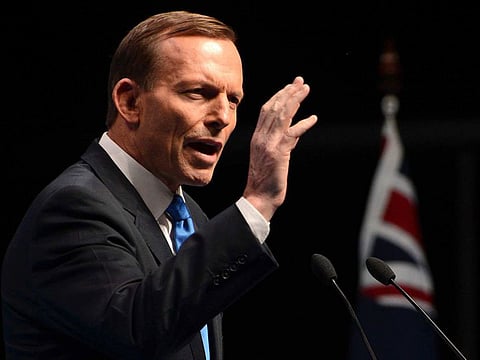Tony Abbott, the ‘lonely nihilist’, has a lesson for us
The Australian PM came to power on a platform of stopping, axing and cutting. Now Abbott is teaching us about himself

The British conservative philosopher, Michael Oakeshott, has been and remains a profound influence on conservatives — from Margaret Thatcher to Andrew Sullivan. He also counts among his admirers the prime minister, Tony Abbott. Oakeshott, who died in 1990, was suspicious of modern, rationalist political projects, but is beloved because of his espousal of a “conservative disposition” that prefers “the sufficient to the superabundant, the convenient to the perfect, present laughter to utopian bliss”. He fancied himself as a kind of Tory anarchist.
In a famous 1963 essay, Oakeshott’s social-democratic contemporary Bernard Crick said he was more of a “lonely nihilist”. Oakeshott didn’t think the state could be harnessed to improve the collective good, and rejected most modern political programmes — including social democracy — as modernist folly. Crick, who thought messy, conflictual, democratic politics could deliver a better lot to ordinary people, was having none of that. He thought that Oakeshott’s preference for a conservatism that was little more than a series of vague sentiments meant he was left with not a great deal to say. As Crick put it, “clearly, if all ‘illusions’ and pursuits of the ideal and ‘new men’ were stripped away, there would be nothing left: a kind of suicide of the man, the book, the subject, and the tradition”.
Abbott has gradually, inexorably, fallen into the same trap as his hero. Despite the many disastrous troughs of the past two years, he has never looked lonelier, or more nihilistic than he does at the moment. On loneliness, consider the numbers. The disastrous Ipsos poll on the weekend is not an outlier, it’s on trend . According to Ipsos, fewer than four in 10 Australians are prepared to vote for his party, and of those, only one in three have a preference for Abbott, the sitting prime minister, as leader. Just over 13 per cent of us are happy to vote for Tony Abbott. On the other hand, almost seven in 10 oppose his stand on same-sex marriage (in the youngest voting demographic, this rises to almost nine in 10) and six in 10 think the country is not doing enough on climate change, having not seen any “real action” to speak of. Through no fault of Bill Shorten’s, just a year from an election deadline, Abbott is looking like a oncer. Abbott stinks more than ever among voters, and inevitably that means his party room are catching a whiff. The leaks have begun again in earnest, but now cabinet colleagues are publicly briefing against the prime minister’s preferred policies in areas where community sentiment runs in the other direction.
Purely tactical considerations
And this is where we come to Abbott’s nihilism, which, to be fair, he shares with large swathes of his party and the broader conservative movement. It’s difficult to come to any other assessment of Abbott’s moves over, say, same-sex marriage. The need to reject marriage equality led Abbott and his staff to negate every value that stood in the way of realising that goal. Texts leaked indicated that he lied to Cabinet colleagues. The plan to hold a plebiscite shows a willingness to subvert popular opinion by rigging the terms of the debate, as his mentor John Howard did with the republic. And the decision to remove the issue from parliamentary purview shows his respect for that institution depends on the political moment. The reactionary urge to quash the inevitable legal recognition of same-sex partnerships overwhelmed any residual conservative desire to defend a time-honoured institution. After all that, who can really say whether he acted out of personal conviction, or a simple desire to manage his party room by keeping his rightwing backers sweet?
Copious commentary, salted with anonymously sourced Liberal griping, tells how Abbott’s office is reactive, constantly seeks meaningless announceables, and is driven by purely tactical considerations. Often enough, the blame for this is sheeted home to Peta Credlin. Yet this style of government is possible, perhaps even necessary, if there is no broader moral or intellectual project afoot within the government, or the broader Liberal party. Abbott came to office on a platform of pure negation, promising to stop, axe and cut things. With those destructive ends either achieved or stalled in the Senate, there is nothing more for him to say. He is opposed to anything that looks like political progress, but often enough he can’t or won’t say why. The contempt for the public he so clearly reveals in his crude machinations are reflected in the public’s opinion of him. And he is having trouble constructing an appeal for more time because he has no goals to point towards. At least in political terms, Abbott represents the “suicide of the man ... and the tradition”. For one more year we will be forced to watch him further unravel. But he is inadvertently teaching us a lesson. To those in political life who misrecognise their own cloistered professional ideology as “pragmatism”, a purely tactical politics seems like the smart thing to do. Abbott shows us that such nihilism is fragile and isolating.
— Guardian News & Media Ltd
Jason Wilson is a visiting fellow at Swinburne University’s Institute for Social Research, and lives in Portland, Oregon.



